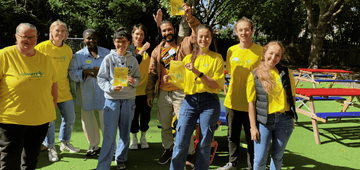Ian Noonan, Consultant Nurse for Mental Health at Calderdale & Huddersfield NHS Foundation Trust, shares his experience as a Making Every Contact Count (MECC) for Mental Health Lead Trainer.
Ian heard about the opportunity to become a MECC for Mental Health from information circulated by colleagues already involved in MECC.
“I have many fabulous colleagues at work who are committed to integrating mental health into their physical health, medical, surgical, diagnostic, therapies, and community services. Some have expressed caution about asking the “wrong” question, or not knowing what to do with the answer. It is a joy to see the confidence they express when adding MECC for MH to their toolkit as it is a clear and easily accessible model for person centred very brief interventions that support both the practitioner and the patient to have essential conversations about mental health.”
What made you decide to get involved?
There is no health without mental health and I have many colleagues working in the hospitals and community in Huddersfield and Halifax who wanted to be able to support the mental health needs of people they were seeing for support with their physical health needs. MECC for Mental Health offered such an accessible framework for my colleagues to be able to integrate mental health conversations into their everyday work.
In your view what is the strategic case for MECC for Mental Health?
We are committed to promoting inclusion and balancing the parity of esteem for physical and mental health needs. The trust has inpatient acute hospitals and provides specialist secondary community care and recognises that many people living with long-term conditions will experience mental distress and illness. We have both public health and health inequalities leads in the trust and parity of esteem for people with mental illnesses is one of our key aims. MECC for Mental Health has already begun to contribute in a key way to these goals.
How did you train to become a MECC for Mental Health trainer?
I used the e-learning, on-line resources, and journals to orientate myself to the course content and attended two days of facilitated learning, including the opportunity to co-facilitate a practice teaching session with one of the other participants, and to observe and offer feedback on the teaching of others. It felt like a real collaboration. It was warming and motivating to meet and work with a like-minded group of colleagues from different disciplines and organisations across the region, to explore each other’s approaches to mental health promotion and to recognise that mental health is everyone’s business. The training is flexible enough to be incorporated into and adapted for different contexts whilst maintaining the core approach of very brief interventions in which we Ask (twice), Assist, and Act to support the mental health needs of others and signpost appropriate services.
The facilitation style was really engaging and allowed participants to clarify understanding and apply learning to our own professions and services.
How was the experience of organising and delivering MECC for Mental Health training?
There is a reasonable amount of admin (not always my strength) to set up the training sessions, but communication with participants in advance, circulation of links to the Future NHS platform for resources, pre- and post-training surveys, and links to recommended pre-e-learning, seemed to really help the participants engage with and prepare for the training.
Can you provide a brief description of the group/s you delivered the training to?
I have delivered one train the trainer course to 10 health, social, and local authority health and wellbeing practitioners from across Yorkshire, including social prescribers, mental health lecturers, wellbeing practitioners, child and family practitioners – all of whom have experience delivering training within their roles. In our one-to-one tutorials that follow after the two days training to become trainers, participants explained how for some they were training colleagues and volunteers who had specific health and wellbeing roles, and for others, their organisations were committed to providing end user MECC for Mental Health training for all of their teams, even building it in to their induction programmes for new employees.
I have 4 days of end user training planned for allied health care professionals including physiotherapists, speech and language therapists, podiatrists, occupational therapists; community and inpatient adult nurses; midwives; and pharmacists; and am also piloting in partnership with a local university, providing train the trainer 2-day sessions for final year mental health nursing students who will then go on to train first and second year adult, children, and learning disability nursing students to integrate MECC for MH in to their practice.
I have delivered the training online and in person. Both work and for a large geographical area such as Yorkshire & the Humber, online has its practical advantages, but there is also a real joy in getting teams together in person and to see that live commitment to promoting the mental health of people in their care.
For our next three training days for end user training, we are inviting colleagues from local health, social, and wellbeing charities to join with the hospital and NHS trust staff. We have taken the view that we are all supporting the mental health needs of people in our local communities and that if we join the training up, we will also get to know each other’s services better – particularly helpful for module three where we map local service provision and emergency responses.
Can you provide a brief description of the training programme you delivered?
For the end point user training, I have offered the training as either 3 x separate modules or the condensed one-day version. Everyone has agreed that the one-day version is easier to commit the time to.
For the train the trainer days, I delivered these as two consecutive days, and wonder whether having a week in between would have allowed a little more time to reflect on the learning as we went. So far these have been to mixed professional groups and that has added a real richness to the discussions
How do you think the training has been received by participants?
Participants were able to immediately apply the learning to their practice and could think of examples of how they could implement this in both their training and other person-centred roles. I asked learners to think which one of the techniques they might try first in their work with the next person they see. They posted in the chat clear examples from the teaching: ask twice; assist (by listening further); act; check-chunk-check; meeting with and finding out about local services, which left me confident that the learning was embedding
What difference do you think MECC for Mental Health will bring to the people you trained?
My hope is that it will give people the confidence to integrate conversations about mental health into their everyday practice. That way, we can move away from the separation of physical and mental health and recognise the impact both have on each other – both in terms of risking exacerbation of illness, but also in the promotion of recovery and wellbeing. Participants were already committed to mental health promotion, but described feeling confident to support colleagues to appreciate and practise that mental health is everyone’s business; not to fear asking; to be able to hear and acknowledge what someone says; and to support them to access the right service to help with this.
As a group of trainers we also shared training techniques and tips and learned from the teaching practice and from observing others, so I hope that the train the trainer sessions will also have helped participants to enrich their facilitation repertoire.



